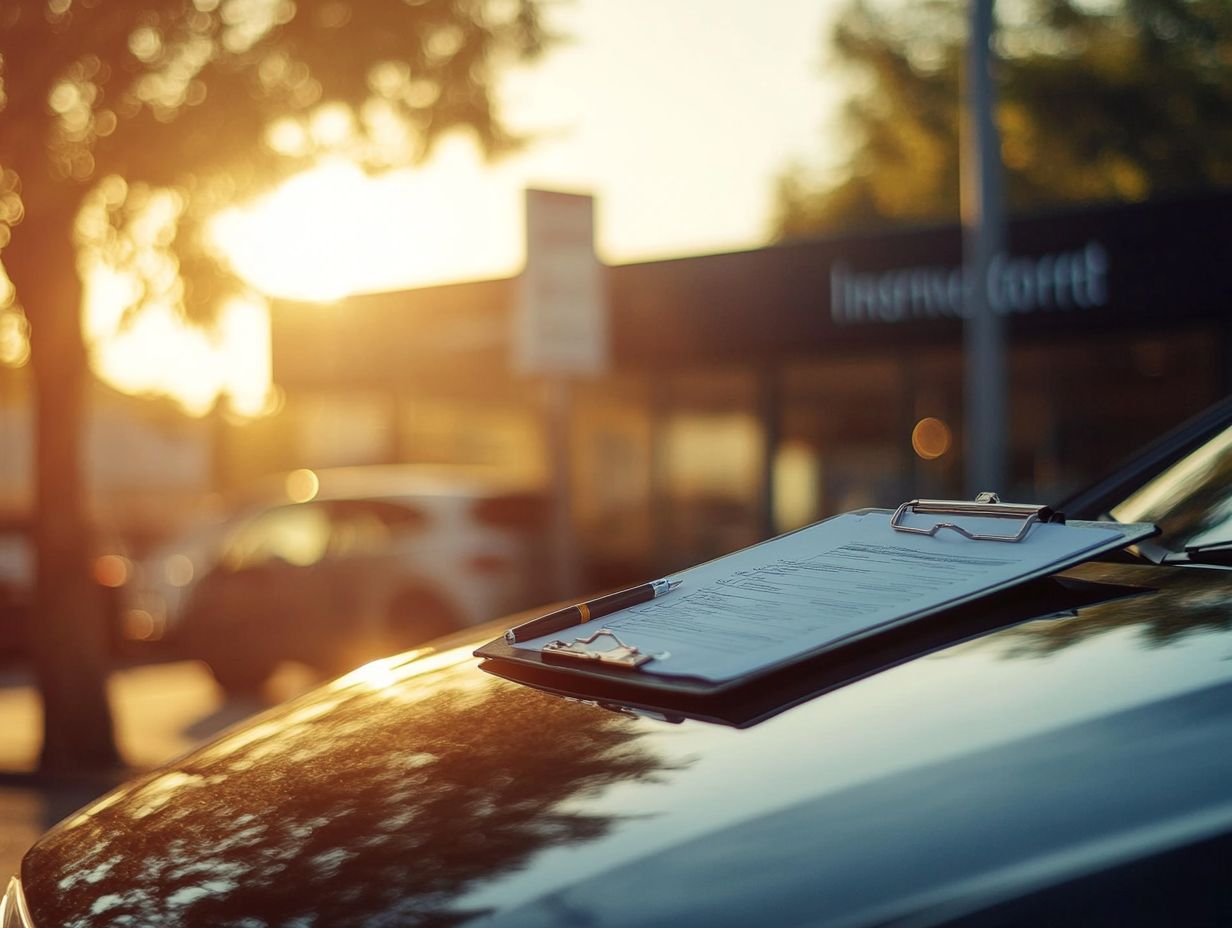The Role of Coverage in Rental Car Agreements
When renting a car, understanding the rental agreement is key for a stress-free journey!
Coverage can often feel like a maze of terms and conditions, leaving renters confused about what s included and what s not.
This article simplifies the various types of coverage available, highlights their importance, and offers essential tips for navigating your choices.
From Collision Damage Waivers to Liability Coverage, you’ll learn how to make informed decisions that protect both you and your wallet.
Contents
- Key Takeaways:
- Understanding Rental Car Agreements
- The Importance of Coverage in Rental Car Agreements
- Types of Coverage Offered in Rental Car Agreements
- Factors to Consider When Choosing Coverage
- Tips for Dealing with Coverage in Rental Car Agreements
- Frequently Asked Questions
- What is the role of coverage in rental car agreements?
- What type of coverage is typically included in rental car agreements?
- Do I need to purchase additional coverage when renting a car?
- Can I decline coverage when renting a car?
- What happens if I get into an accident while driving a rental car?
- Is coverage the same for international rental car agreements?
Key Takeaways:

- Understanding coverage in rental car agreements is crucial to avoid unexpected costs and disputes.
- Coverage provides protection for potential damages, accidents, and liability, making it an important consideration when renting a car.
- When choosing coverage, consider the cost and level of protection, as well as your personal insurance coverage.
- Knowing your coverage options can prevent lapses in protection and ensure peace of mind.
Understanding Rental Car Agreements
Understanding rental car agreements is essential for both first-time renters and seasoned travelers. These documents outline how to use the car, your responsibilities, and any risks involved.
Whether you re renting a car in a bustling city like New York or a more laid-back spot in North Carolina, knowing what you’re signing up for is crucial. This knowledge can significantly influence your travel experience and your financial responsibility should accidents or damage occur.
This agreement isn t just fine print; it s a binding contract that specifies insurance options, costs, and other important rental details.
What is Covered and What is Not?
Understanding what s included in your rental car insurance policy is crucial, as it directly impacts your financial responsibility in case of an accident or damage to the vehicle.
Selecting the right insurance coverage can make a real difference. For instance, collision coverage helps cover costs if the rented vehicle is damaged in an accident. Many agreements include damage waivers, which can reduce your liability if the car is stolen or damaged beyond repair. To better understand your options, it’s important to know what coverage for rental trucks is. Loss of use coverage safeguards you against charges that may arise while the vehicle is being repaired.
By familiarizing yourself with these options, you can prepare for unforeseen circumstances, ensuring a more secure and worry-free rental experience.
The Importance of Coverage in Rental Car Agreements
Coverage in rental car agreements isn’t just a footnote; it’s a crucial component of the rental process that can shield you from unexpected financial strains. For more details, check out understanding coverage for rental cars.
When you rent a vehicle, grasping the different insurance options available such as liability insurance and personal accident insurance is essential.
Also, evaluate how your current homeowners insurance or personal auto policy might extend some coverage while driving a rental. Being informed can significantly enhance your rental experience and contribute to your overall peace of mind.
Why Coverage Matters
Coverage is vital because it provides financial protection against unexpected incidents, like accidents or theft of your rental car, allowing you to enjoy your journey with peace of mind.
In the unfortunate event of an accident, having the right insurance can mean the difference between a minor inconvenience and a significant financial burden. For example, if your rental car gets damaged in a collision, comprehensive coverage can help cover repair costs, while a damage waiver might relieve you of any financial responsibility for the vehicle’s depreciation.
If your car is stolen, these coverages become essential in protecting you from substantial losses. It s important to understand these distinctions so you can make informed choices that suit your individual needs.
Types of Coverage Offered in Rental Car Agreements

When renting a vehicle, it s crucial to grasp the various types of coverage available in rental agreements. Knowing this can help you avoid unexpected costs.
Rental car companies generally present a range of insurance options, including:
- Collision damage waivers that can spare you from substantial repair costs,
- Liability coverage that covers damages to other vehicles, and
- Personal accident insurance that offers medical coverage for both you and your passengers.
Each type of coverage fulfills a distinct purpose. Understanding these options enables you to customize your rental experience to align with your needs.
Collision Damage Waiver
A Collision Damage Waiver (CDW) means you won t have to pay for repairs to the rental car if it gets damaged, as long as you follow the rules set by the rental company.
This coverage generally allows you to drive with a sense of security. If an accident happens or the vehicle sustains damage, you might avoid those steep repair bills.
However, it’s crucial to understand the details of a CDW. While it can significantly lessen your out-of-pocket expenses, it often comes with limitations, such as exclusions for negligent behavior or driving under the influence.
When navigating rental agreements, understanding the specifics of a CDW can empower you to make informed choices about whether to purchase it or depend on your personal auto insurance or credit card coverage for similar protection. By carefully weighing the benefits against the potential drawbacks, you can identify the option that best suits your needs.
Liability Coverage
Liability coverage is an essential aspect of rental car insurance, designed to protect you from costs that may arise from accidents involving your rental vehicle.
This type of insurance typically encompasses bodily injury and property damage coverage. It ensures that you are protected in the unfortunate event that someone is injured or their property is harmed due to your driving.
The level of coverage can vary widely between rental car companies. Some may only offer the bare minimum required by state law, while others provide far more understanding coverage for long-term rentals that includes comprehensive options.
It s crucial to review the policies of each company carefully. Understanding these differences can significantly impact your decisions and financial outcomes in unexpected situations.
Personal Accident Insurance
Personal Accident Insurance (PAI) offers you essential coverage for medical expenses and accidental death benefits for both you and your passengers when using a rental vehicle. This type of insurance is important as it provides financial protection during unforeseen events, ensuring you have peace of mind while navigating the open road.
If you’re renting a vehicle, you typically qualify for this coverage, which is often available through rental agencies and may even be included in your personal auto insurance policy.
While PAI covers a broad range of scenarios, it s important to note that certain exclusions do apply. For instance, coverage might not extend to drivers under the influence of alcohol or drugs, or to those engaging in reckless behavior.
Understanding these nuances empowers you to make informed decisions about your safety and financial security while on your journey.
Factors to Consider When Choosing Coverage
When selecting coverage for your rental car, a multitude of factors must be considered. The balance between cost and protection stands out as a primary concern.
You ll need to evaluate the potential risks against the financial repercussions of different coverage options, such as credit card insurance and personal insurance policies.
Grasping these nuances is crucial for making informed choices that resonate with your travel habits and risk tolerance.
Cost vs. Protection

The cost versus protection debate is a crucial consideration when renting a car. Opting for higher coverage often means facing increased expenses.
Understanding the implications of your choices is essential for making informed decisions. While basic plans might initially look financially appealing, they often leave you exposed to significant out-of-pocket costs in the event of an accident or theft. Conversely, comprehensive coverage, although more expensive, offers peace of mind by covering a broader range of risks, including damage to the vehicle, personal liability, and even medical expenses.
As you weigh your options, carefully assess your own risk tolerance and budget. Recognizing that more extensive protection could save you from substantial financial burdens in the event of any mishap is key to making a choice that aligns with your needs.
Personal Insurance Coverage
Personal insurance coverage, such as homeowners insurance or your existing car insurance, can significantly influence your decision-making when renting a vehicle.
Understanding the details of these policies is essential, as many provide a safety-net for rental cars. This could save you from incurring additional coverage costs from rental companies. For instance, if you already have comprehensive and collision coverage on your personal auto insurance, it often extends to rental cars. This means it covers damage to your car and accidents, offering you peace of mind while you re on the road.
As a renter, it s wise to be aware of your policy’s terms, deductible amounts, and any geographical limits that might come into play. Taking the time to clarify coverage specifics with your insurance provider can help you avoid surprises, ensuring a smooth trip and robust financial protection.
Tips for Dealing with Coverage in Rental Car Agreements
Navigating coverage in rental car agreements can be intricate, but with a few strategic tips, you can simplify the process and make informed choices about understanding the role of coverage in accidents.
One crucial step is to carefully examine the fine print of your rental agreement. Pay close attention to the insurance details provided by the rental company. Being prepared to handle claims and disputes can save you time and money, ensuring your rental experience is not only hassle-free but also enjoyable.
Reading the Fine Print
Reading the fine print in rental car agreements is absolutely essential for grasping the insurance parameters and specific terms that govern your rental experience.
Neglecting to scrutinize these documents could leave you facing unexpected charges or limitations on coverage that might impact your travels. Many lessees often overlook critical elements such as the fuel policy, mileage restrictions, and additional driver fees.
It s crucial to pay close attention to clauses regarding damage waivers and liability, as these can vary significantly from one company to another. Understanding the terms surrounding roadside assistance and what services are included can save you considerable headaches in case of emergencies.
By being attentive to these details, you can sidestep pitfalls that might otherwise lead to unpleasant surprises when returning the vehicle.
Dealing with Claims and Disputes
Dealing with claims and disputes in rental car agreements can feel overwhelming. However, being well-prepared can transform the process into something far more manageable and less stressful.
To effectively navigate this challenging landscape, gather all pertinent documentation this includes your rental agreement, any incident reports, and photographs of any damage.
Clarity and conciseness in your communications are key, whether you’re reaching out to the rental company or your insurance provider. Adopting a polite yet assertive tone can significantly enhance your chances of achieving favorable outcomes.
It’s crucial to familiarize yourself with the specific policies of the rental agency; this knowledge will help you anticipate potential hurdles. By meticulously maintaining records and encouraging open dialogue, you can resolve claims more efficiently and with greater peace of mind.
Before you rent, double-check your insurance coverage to avoid unexpected costs!
Frequently Asked Questions

What is the role of coverage in rental car agreements?
Coverage in rental car agreements offers protection and financial security. Understanding what coverage for rental vehicles entails benefits both the rental car company and the renter in case of accidents or damages.
What type of coverage is typically included in rental car agreements?
Most rental car agreements include basic insurance that protects you if you cause damage. Collision coverage pays for damages to the rental car in an accident, while comprehensive coverage covers non-collision incidents, like theft.
Do I need to purchase additional coverage when renting a car?
It s not necessary to purchase additional coverage since most rental car companies provide basic coverage. If you want more protection or your personal insurance doesn t cover rental cars, consider purchasing additional coverage.
Can I decline coverage when renting a car?
You can decline coverage when renting a car. However, you will be responsible for any damages or accidents that occur while using the rental car. The rental car company may require a deposit or proof of personal insurance.
What happens if I get into an accident while driving a rental car?
If you get into an accident while driving a rental car, follow the same steps as if you were driving your own car. Contact the rental car company and your personal insurance provider to report the accident.
Is coverage the same for international rental car agreements?
Coverage for international rental car agreements may vary by country and rental car company. It s important to check with both the rental car company and your personal insurance provider to understand your coverage before driving in a different country.
Understanding your coverage is crucial before hitting the road. Make sure you’re prepared for a stress-free rental experience!






